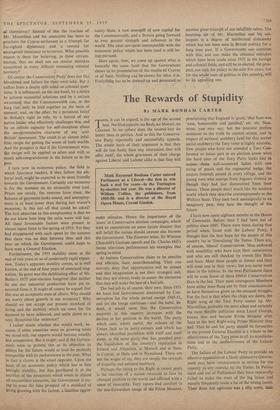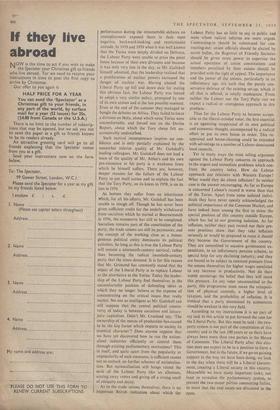The Rewards of Stupidity
By MARK BONHAM CARTER
THIS, it can be argued, is the age of the second best. No Shakespeare, no Bach, no Mozart, no Cezanne. In no sphere does the second-best do better than in politics. And to this the Conserva- tive Party repeatedly and successfully appeals. The whole basis of their argument is that they will do less badly than any alternative that will offer itself; the whole gravamen of their charge against Liberal and Labour alike is that they will
Mark Raymond Bonham Carter entered Parliament as a Liberal—the first to win back a scat for years—in the Torrington by-election last year. He was a director of William Collins, the publishers, from 1955-58; and is a director of the Royal Opera House, Covent Garden.
make mistakes. Hence the importance of the 'scare' in Conservative election campaigns, which tend to concentrate on some future disaster that will befall the nation should anyone else become the Government. The Zinoviev letter, Sir Winston Churchill's Gestapo speech and Dr. Charles Hill's recent television performance are examples that spring to mind.
At bottom Conservatives claim to be sensible and efficient, Suez notwithstanding. They can scarcely deny that opportunities will be missed and that imagination is not their strongest suit, but they are always ready to assure the electorate that they-will make the best of a bad job.
The bad job is, of course, their own. Since 1931 we have had Governments dominated by Con- servatives for the whole period except 1945-51, and Yet the image continues—and the habit. In- deed, it would seem that the Conservative majority in this country increases with the decline in her position in the world. The party which uses, where useful, the colours of the Union Jack as its party colours and which has always identified patriotism with itself and itself alone, is the same party that has presided over the liquidation of this country's reputation in Ireland and Abyssinia, at Munich and at Suez, in Cyprus, at Hola and in Nyasaland. These are not the wages of sin, they are simply the rewards of stupidity and national snobbery.
Perhaps the swing to the Right in recent years is the reaction of a nation reluctant to face its changed position in the world and afflicted with a sense of insecurity. Tory voters find comfort in the neo-Edwardian image of the Prime Minister,
proclaiming that England is 'great,' that Suez was 'wise, honourable and justified,' etc. etc. Non- sense, you may say; but the neurotic prefers nonsense to the truth he cannot accept, and in respect of national snobbery (and for that matter social snobbery) the Tory voter is highly neurotic. Few people who have not attended a Tory Con- ference or taken part in an election know what the hard core of the Tory Party looks like in action—those well-accoutred ladies with one string of pearls and the regimental badge, the majors (retired) posted in every village, and the young men who emerge from Jaguars dressed as though they had just dismounted from their horses. These people don't much like the modern world which they describe contemptuously as the Welfare State. They look back nostalgically to art imaginary past; they hate the thought of the future.
I have now spent eighteen months in the House of Commons. Before then I had been out of politics since 1945. There were times during that period when, faced with the Labour Party, I thought that the best hope for the people of this country lay in 'liberalising' the Tories. There are, of course, 'liberal' Conservatives. Men endowed with sensibility who have kept their consciences and who are still shocked by events like Hola and Suez. Meet these people at dinner and they will meet you in their views, but you never meet them in the lobbies. In the next Parliament there will be even fewer of these liberal Conservatives than in the last. Their most courageous Members have either been flung out by their constituencies or have themselves given up the unequal struggle. For the fact is that when the chips are down, the Right wing of the Tory Party comes up. Mr. Macmillan, probably the most adept and certainly the most flexible politician since Lloyd George, knows that and became Prime Minister after Suez as the best Right-wing Prime Minister they had. That he and his party should be favourites in the present General Election is a tribute to the effectiveness of the Tory press in all its manifesta- tions and to the ineffectiveness of the Labour Party.
The failure of the Labour Party to provide an effective opposition or a likely alternative Govern- ment may have consequences as serious for the country as any mistake by the Tories. In Parlia- ment and out of Parliament they have repeatedly failed to make the most of the big issues and equally ftequently made a lot of the wrong issues. Their Rent Act agitation was a silly scare, their
performance during the innumerable .debates on unemployment exposed them in their most negative, backward-looking and restrictionist attitude. In 1958 and 1959 when it was well known that the Tories were deeply divided on Defence, the Labour Party were unable to press the point home because of their own divisions and because it was only very late in the day, as Mr. Gaitskell himself admitted, that the leadership realised that a proliferation of nuclear powers increased the danger of nuclear war. Having abused the Liberal Party up hill and down dale for stating this obvious fact, the Labour Party was forced to adopt a very similar policy, prompted by one of its own unions and at the last possible moment. Even at the end of the summer they managed to bungle the debates on Africa. They failed to force a division on Hola, about which some Tories were uncomfortable, and forced one on the Devlin Report, about which the Tory sheep felt un- accountably undisturbed.
Such tactical incompetence inspires no con- fidence and is only partially explained by the somewhat inferior quality of Mr. Gaitskell's leading colleagues. Mr. Gaitskell does not lead a team of the quality of Mr. Attlee's and his own pre-eminence in his party is a weakness from which he himself suffers. There are, however, deeper reasons for the failure of the Labour Party to put itself across and to explain the fact that the Tory Party, on its knees in 1958, is on its feet in 1959.
At bottom they suffer from an inheritance which, for all his efforts, Mr. Gaitskell has been unable to slough off. Though he has never been given sufficient credit for the orderly withdrawal from socialism which he started at Bournemouth in 1956, the manceuvre has still to be completed. Socialism remains part of the constitution of the party, the trade unions are still its paymaster, and the concept of the •working class as a homo- geneous political entity dominates its political activities. So long as this is true the Labour Party will remain a nineteenth-century survival, rather than becoming the radical twentieth-century party that the times demand. It is for this reason that Mr. Grimond has constantly stated that the object of the Liberal Party is to replace Labour as the alternative to the Tories. Today the leader- ship of the Labour Party find themselves in the uncomfortable position of defending ideas in which they no longer believe at the expense of concentrating on the critical issues that really matter. No one as intelligent as Mr. Gaitskell can still suppose that the central political contro- versy of today is between socialism and laissez- faire capitalism. Didn't Mr. Crosland say, 'The ownership of the means of production has. ceased to be the key factor which imparts to society its essential character'? Does anyone suppose (hat we have yet discovered how to run the nation- alised industries efficiently or control them through existing parliamentary institutions? This in itself, and quite apart from the popularity or unpopularity of such measures, is sufficient reason not to embark on further schemes of nationalisa- tion. But niitionalisation still hangs round the neck of the Labour Party like an albatross, scaring away voters and giving off a strong smell of antiquity and decay.
As to the trade unions themselves, there is no important British institution about which the Labour Party has so little to say in public and none where radical reforms are more urgent. Contracting-in should be substituted for con- tracting-out; union officials should be elected by secret ballot, the Registrar of Friendly Societies should be given more power to supervise the actual operation of union constitutions and members penalised by their unions should be provided with the right of appeal. The importance and the power of the unions, particularly in an inflationary age, are such that the purely con- servative defence of the existing set-up, which is all that is offered, is totally inadequate. From neither the Labour nor the Tory Party can we expect a radical or courageous approach to this problem.
Thus for the Labour Party to become accept- able to the liberal-minded voter, the first essential is an agonising reappraisal of its own political and economic thought, accompanied by a radical effort to put its own house in order. This re- appraisal and house-cleaning could be extended with advantage to a number of Labour-dominated local councils.
Yet in many ways the most telling argument against the Labour Party concerns its approach to the urgent and immediate problems which con- front the country today. How do Labour approach our relations with Western Europe? What would they do about inflation? In neither case is the answer encouraging. As far as Europe is concerned Labour's record is worse than that of the Tories. Apart from some isolated indivi- duals they have never openly acknowledged the political importance of the Common Market, and have indeed been among the first to stress the special position of this country outside Europe, which has led to our growing isolation. As for inflation, neither their past record nor their pre- sent promises show, that they take inflation seriously or would be prepared to resist it should they become the Government of the country. They are committed to massive government ex- penditure, to an inflationary pension scheme, to special help for any declining industry, and they are bound to be subject to constant pressure from the unions themselves for higher wages unrelated to any increase in productivity. Nor do their words encourage the belief that they will resist this pressure. To any voter uncommitted to the party, this programme must mean the reimposi- tion of physical controls, a higher level of taxation, and the probability of inflation. It is ironical that a party dominated by economists should be weakest in this very field.
According to my instructions it is no part of my task in this article to put forward the case for the Liberal Party. But this must be said : the two- party system is not part of the constitution of this country and in the last 100 years or so there have always been more than two parties in the House of Commons. The Liberal Party after this elec- tion does not expect to be in a position to form a Government, but in the future, if we go on gaining support in the way we have been doing, we look to the day when there will be a Liberal Govern- ment, creating a Liberal society in this country. Meanwhile we have many important tasks; not least to revitalise the parliamentary system, to prevent the two major mirties committing follies, to insist that the real issues are discussed in the open.



































 Previous page
Previous page